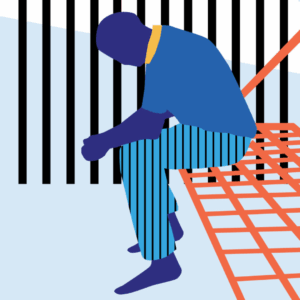
Image: High Court of Trinidad and Tobago
PRESS RELEASE: Longest serving death row prisoner in Trinidad & Tobago released by High Court
- News
- 16 Nov 2023
Press release
On 14 November 2023, Wenceslaus James, the longest serving death row inmate in the country, was released by order of the High Court of Trinidad and Tobago. Convicted for murder in 1996, Wenceslaus received the mandatory death sentence for the offence. The Death Penalty Project (DPP) worked on the case alongside UK barrister Amanda Clift-Matthews and local attorney Daniel Khan in a lengthy legal battle for his release.
Having spent over three decades in custody, including 24-years on death row, Wenceslaus James is the longest serving death row inmate in the country. Throughout his detention, he has suffered extraordinary conditions including a near-death experience, when in 1999 his scheduled execution was halted without warning at the very last minute.
One morning in 1999, Wenceslaus was read his warrant of execution. He was taken to a cell awaiting execution, where he recalls “there was blood and vomit and excrement on the floor from the previous persons waiting to be hanged.” Adding to this horrifying experience, that morning he also heard the execution of his cell mate and co-defendant Antony Briggs. With his execution seemingly imminent, suddenly without explanation he was taken back to his cell. He was not executed that day.
In the same year as his near-death experience, living in a cell right next to the gallows, Wenceslaus lived with the anguish and trauma of hearing nine other executions take place.
Wenceslaus, recalling the execution of his cell mate and co-defendant, said: “I could see the rope and hear the snap of the trapdoor. It still haunts me. I feel sick and weak. It was the most horrible experience of my life.”
Wenceslaus was convicted under the felony-murder principles. Had his case been heard now, based on the current law, the death sentence would not be mandatory, and he would be sentenced to a fixed term of imprisonment.
The High Court resentenced Wenceslaus to a determinate sentence, which he has already served. Wenceslaus James has now been released from prison.
Saul Lehrfreund, Co-Executive Director of The Death Penalty Project who led the legal team, said:
“We are delighted with the decision of the High Court of Trinidad and Tobago to release Wenceslaus. Having served such an extraordinary amount of time and suffering on death row, there was a clear breach on his constitutional rights. Trinidad and Tobago is the only country in the Commonwealth Caribbean to continue using a mandatory death penalty and the government themselves accept the mandatory imposition of the death penalty is cruel and inhuman punishment. We have worked extensively in Trinidad & Tobago for more than three decades and will continue do so and focus our efforts on legislative reform until this barbaric practice is abolished.”
ENDS
Notes to Editors
Facts about the case
In 1996 Wenceslaus James was convicted and sentenced to death for murder of a taxi driver, the mandatory punishment for murder in Trinidad and Tobago.
In March 1997, James appealed to the Court of Appeal in Trinidad and Tobago which was dismissed. In October 1997, the Judicial Committee of the Privy Council (JCPC) refused James’ leave to appeal his conviction. In 2003, the Court of Appeal dismisses James’ second appeal, after his matter was sent back for the Court to consider fresh evidence.
In 2017, The Death Penalty Project, assisted local attorney Daniel Khan to file for constitutional motion challenging his death sentence. On June 8, 2020, the High Court of Trinidad & Tobago quashed Wenceslaus’ death sentence, making him eligible for re-sentencing.
The death penalty in Trinidad and Tobago
In 2021 The Death Penalty Project’s challenge to the constitutionality of the mandatory death penalty in Trinidad and Tobago was dismissed by UK Privy Council. The Government of Trinidad and Tobago have publicly accepted that the mandatory death penalty is a cruel and inhumane punishment, as noted by the Privy Council in their judgment, however the Government have argued that the decision to remove it should be left to politicians and not the courts, and successfully fought to prevent the mandatory death penalty from being struck down. The mandatory death sentence remains the mandatory sentence for murder, which removes the opportunity for judicial discretion and fails to consider mitigating circumstances.
The Death Penalty Project
The Death Penalty Project (DPP) is a legal action NGO with special consultative status before the United Nations Economic and Social Council. The DPP is based at, and supported by, London legal firm, Simons Muirhead Burton LLP. For more than three decades, the DPP has worked to protect the human rights of those facing the death penalty. We use the law to protect prisoners facing execution and promote fair criminal justice systems, where the rights of all people are respected.
For media enquiries, including interview requests, quote, and more information please contact Isobelle, Communications Officer, The Death Penalty Project: [email protected]
Press coverage
For the latest media coverage of the release of Wenceslaus and our other news, please visit ‘DPP in the Media‘

















